Online shopping experienced unprecedented growth in 2020 due to the COVID-19 pandemic. Lockdowns across the globe forced consumers to turn to digital platforms to do their shopping, which boosted eCommerce in the United States. According to eCommerce stats, retail eCommerce sales aren’t showing any signs of slowing down soon and it’s anticipated that worldwide sales will exceed $7 trillion by 2025.
The eCommerce industry can be incredibly lucrative for sellers. However, because of the sheer volume of brands and businesses online, it could be hard for one to stand out. From social media to SMS marketing, here are some of the tools you can explore to bolster your eCommerce marketing efforts.
Top eCommerce Marketing Tools and Trends for 2024:
Top eCommerce Marketing Tools for 2024
Top
ecommerce marketing tools
2024
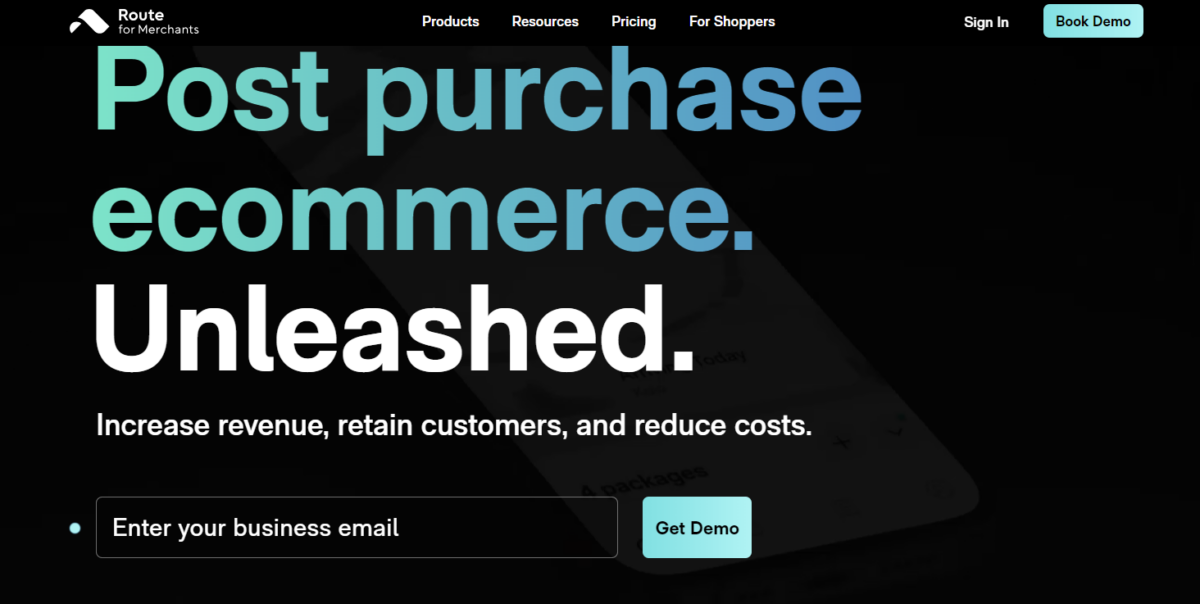

Best for: Businesses of all sizes
Route is an innovative tool designed to revolutionize the post-purchase experience. It is an eCommerce marketing platform that leverages the power of advanced AI to target millions of consumers to extend engagement beyond the initial purchase. Specifically designed to increase customer lifetime value, Route has demonstrated a notable 25% rise in this area, coupled with an impressive $1M+ incremental sales revenue for merchants. Furthermore, it offers an average of 5% lift in revenue per order, showcasing its effectiveness in driving sales growth.
But Route’s biggest selling point is its package protection. This feature guarantees the safe delivery of items by shielding them against loss, theft, or damage, thereby instilling a sense of security and trust in the customers. Additionally, the package protection feature simplifies the resolution process for shipping issues, allowing customers to quickly address concerns through Route’s intuitive platform, further enhancing the customer service experience.
Key Features
- Intelligent Cross-Selling
- Real-Time Shipping Updates
- Carbon-Neutral Shipping
- Remarketing Engine
- Instant Resolution Technology
Pricing
Route’s pricing is tailored to fit diverse business needs, with a Pro Plan starting at $349. For businesses requiring customized solutions, Route offers a Custom Plan with pricing based on specific requirements. There is also a free plan available.
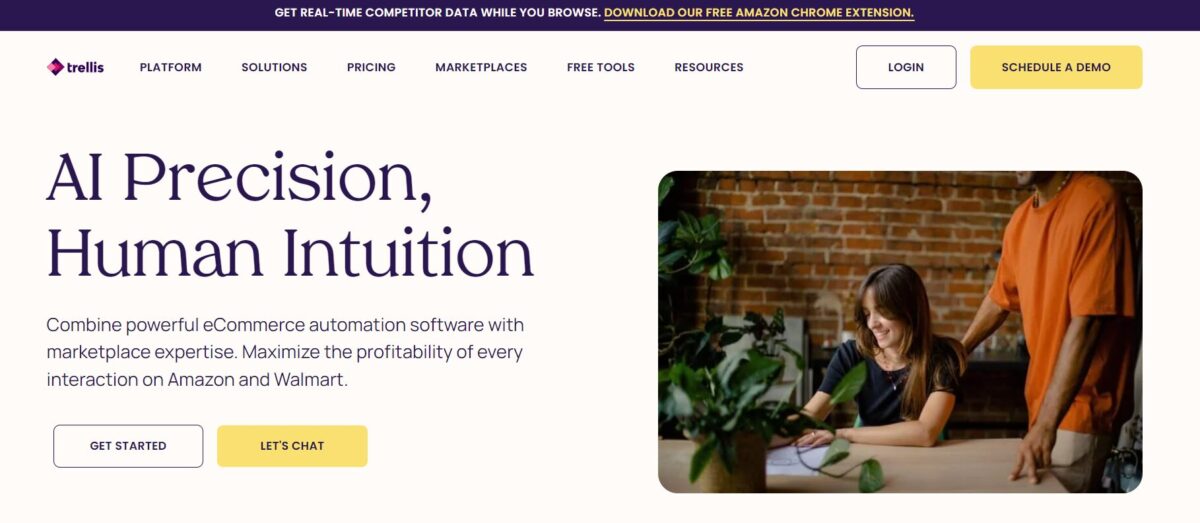

Best for: Ecommerce brands of all sizes
Trellis is a comprehensive eCommerce marketing tool designed to empower Amazon sellers with advanced AI-driven capabilities, automation, and a streamlined user experience. Aimed at optimizing merchandising and advertising efforts, Trellis offers a suite of tools that cater to the needs of sellers looking to supercharge their Amazon sales and visibility. With a strong emphasis on data-driven decision-making, Trellis stands out by providing actionable insights that drive sales growth, improve listing quality, and enhance advertising efficiency.
One of Trellis’ standout features is its Free Amazon Sales Estimator, a pivotal tool for product research and strategy evaluation. By analyzing historical sales data, product rankings, and market trends, the Sales Estimator offers sellers a glimpse into potential monthly sales volumes, enabling them to make informed decisions regarding inventory, pricing, and sales strategies. This tool demystifies the complexities of the Amazon marketplace, offering a solid foundation for sellers to optimize their product offerings.
Key Features
- Amazon Listings Checker
- Free Keyword Research Tool
- Breakeven ACOS Calculator
- Competitor PPC Analysis
Pricing
Trellis adopts a flexible pricing model to accommodate the diverse needs of Amazon sellers. Paid plans starts at $299/month with ‘Entrepreneur,’ designed for eCommerce sellers with up to $2 million in annual sales revenue. The plan includes ad placements and content production features.
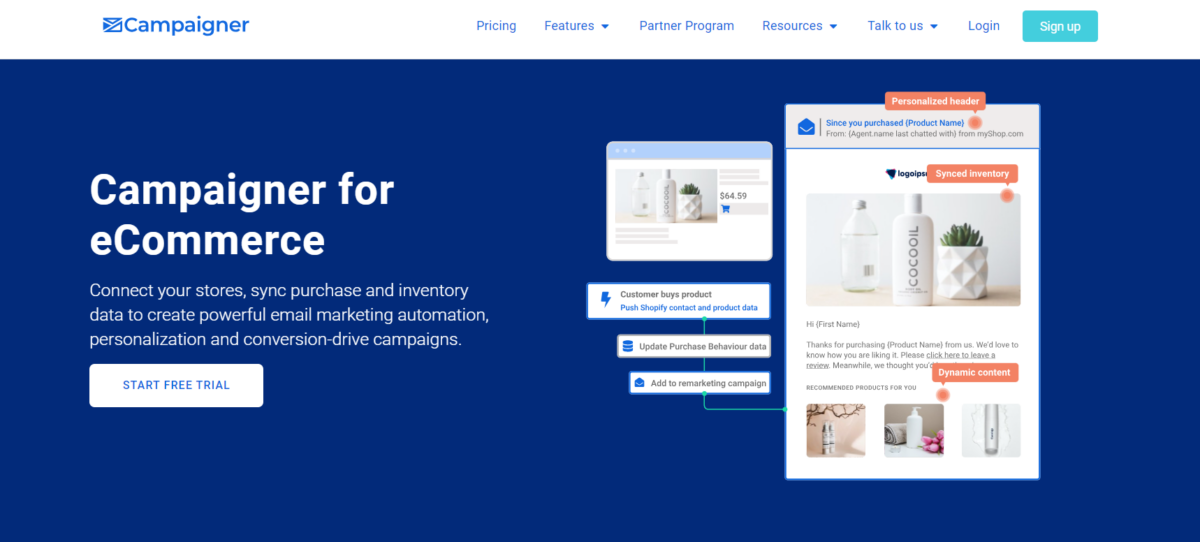

Best for: Small to medium-sized businesses (SMBs), although also viable for larger companies
Campaigner emerges as a pivotal eCommerce tool for online retailers focused on harnessing the full power of email marketing to bolster customer engagement, enhance brand visibility, and drive sales, both new and repeat. With its advanced capabilities, Campaigner enables you to connect your stores, synchronize purchase and inventory data, and deploy targeted email marketing campaigns that are both personalized and conversion-oriented.
The cornerstone of Campaigner’s offering is its powerful segmentation, deep insights into customer behavior, and dynamic content customization. These features allow you to craft highly personalized email messages based on a wide array of customer data points such as purchase history, lifetime value, and demographic details. The integration capabilities with platforms like Shopify and Magento further streamline the process, enabling seamless data sync and efficient campaign execution.
Key Features
- Automated email campaigns
- Drag and drop email editor
- Transactional email support
- Multi-store management
- Customizable subscription forms
Pricing
Campaigner for eCommerce offers a scalable pricing model to accommodate businesses of various sizes with a free 30-day trial and four pricing plans. Paid plans begin with Starter at $59/month.


Best for: Small to midsize eCommerce businesses
If you’re just beginning to get into the eCommerce industry, building your online store using Shopify is highly recommended. The all-in-one eCommerce tool is easy to navigate, straightforward, and intuitive to set up. Additionally, it allows you to connect to external selling platforms and third-party apps.
Key Features
- Optimized for use on mobile devices
- Website and shopping cart creation tool
- Access to consumer data
- Unlimited product inventory
- Supports all popular modes of payment
Pricing
After a free, three-day trial, Shopify’s pricing starts at $25 per month. If you opt to be billed annually instead you can save 25%.
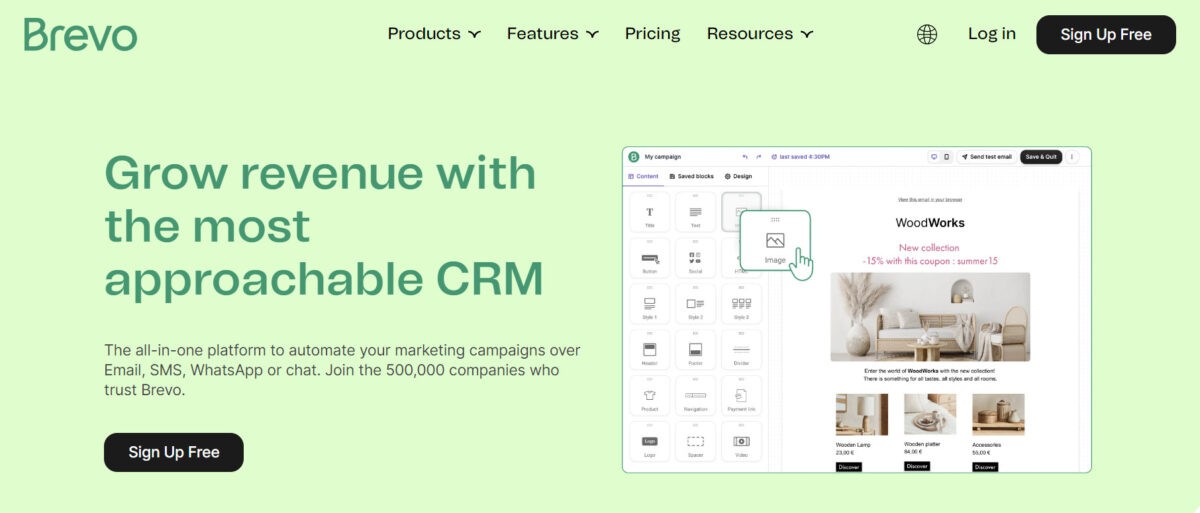

Best for: Businesses of all sizes looking to maximize revenue and establish lasting customer relationships.
Brevo is a standout eCommerce marketing platform that empowers businesses to maximize their revenue by establishing lasting connections with customers. With a user base of over 500,000 companies, including notable names like Michelin, eBay, and Huawei, Brevo is trusted globally for its comprehensive eCommerce marketing solutions. It also offers an integrated inbox for email, Facebook, Whatsapp, and Instagram, and it can also be used for Facebook Ads, WhatsApp campaigns, and live chat.
Key Features
- Email Marketing
- SMS Marketing
- Marketing Automation
- Landing Pages
- Reporting
- Signup Forms
Pricing
Brevo offers flexible pricing plans tailored to different budgets. Starting with a free plan that allows 300 emails per day and unlimited subscribers, it scales to accommodate varying needs.
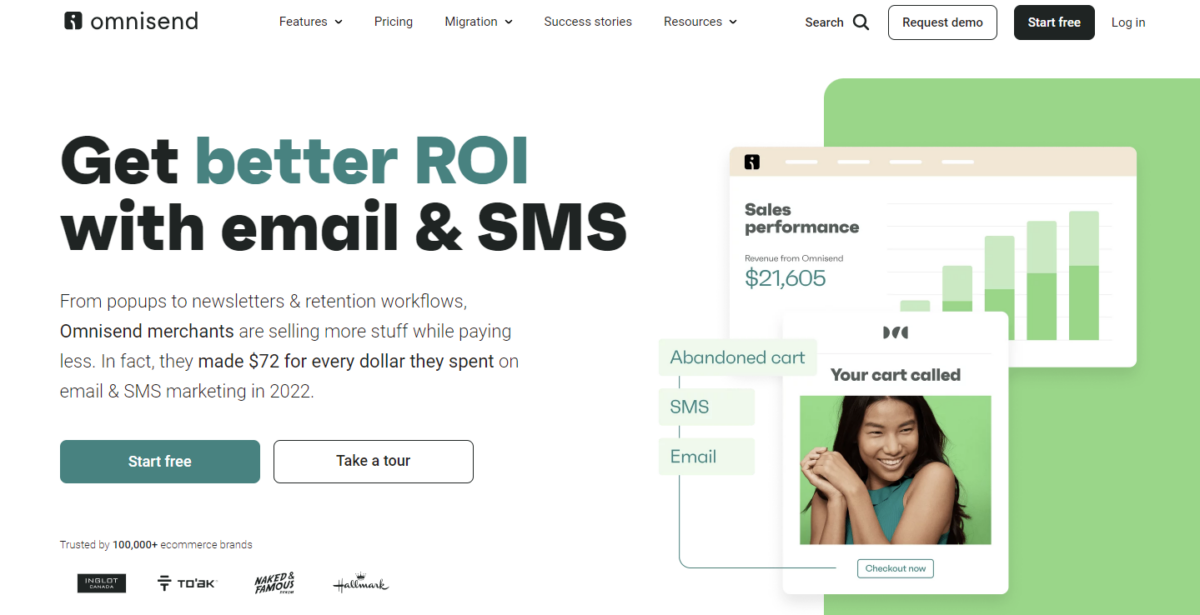

Best for: Omnichannel marketing
Geared toward eCommerce businesses, this marketing tool allows business owners to create marketing strategies that are proven effective for online shopping platforms. Using Omnisend, online sellers can use multiple channels to connect with their customers. They can also leverage Omnisend for precise targeting through personalized texts and emails.
Key Features
- Push notifications
- SMS notifications
- Seamless integration with other eCommerce platforms
- Easy automation
Pricing
Omnisend has a free plan that allows you to use the software’s most basic functions. After a free trial, its paid plans start at $16 per month.
Best for: Instagram marketing
For eCommerce brands that rely heavily on Instagram, there’s Iconosquare, a platform for social media analytics, scheduling, and management. It shines in the analytics department, helping you to improve your Instagram marketing campaigns. Aside from analytics, it also makes it easy to schedule posts to Instagram and Facebook.
Key Features
- Advanced analytics
- Custom dashboards
- Various reports
Channels
Iconosquare offers analytics, custom dashboards, reports, automatic scheduling, and post approval for:
- TikTok
Pricing
After a free, 14-day trial, pricing starts at $59 per month (or $49 per month when billed annually).
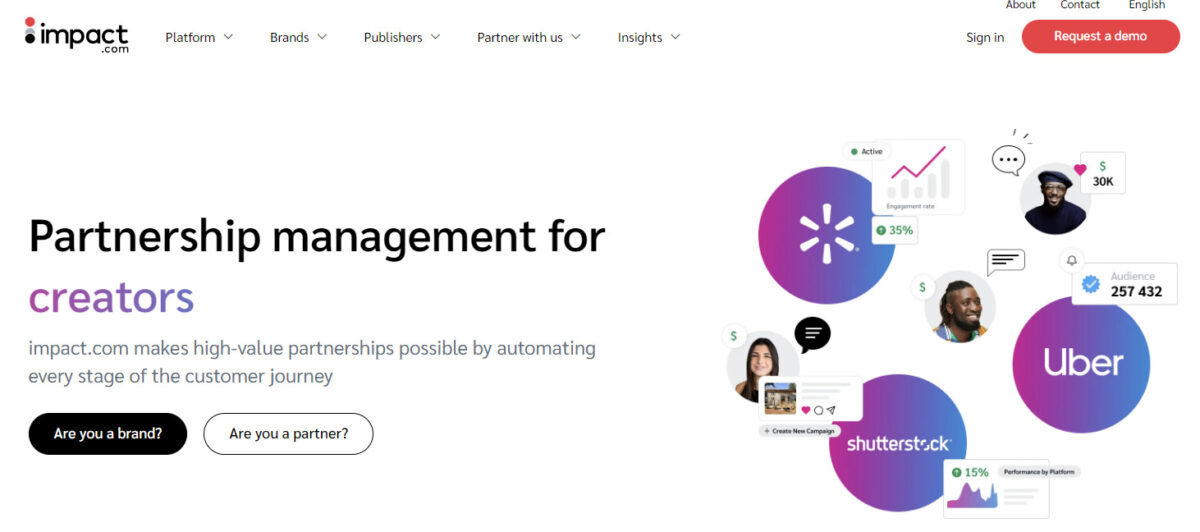

Best for: Affiliate marketing
Trusted by names like Levi’s, Walmart, and Adidas, impact.com can help eCommerce brands to generate new revenue via affiliate marketing and other types of partnerships. You can use it to discover and recruit new partners, automate campaigns, contracting, payouts, and monitor the traffic generated by new partners. It also integrates with WooCommerce, Shopify, Centra, and BigCommerce, making product gifting and the sharing of promo codes much easier.
Key Features
- Cross-device identification
- Custom reporting
- Actionable insights
- Fraud protection
- Comprehensive tracking
Pricing
Pricing details aren’t shared on their website, but you can request a demo with their sales team for more info.


Key Features: Influencer Content Amplification, Search/Discovery, Automated Recruiting, Influencer Relationship Management, Influencer Marketplace, Team Collaboration Tools, Content Review, Content Library, Campaign Management, Campaign Reporting, Influencer Analysis, E-commerce Tools, Product/Gifting Tools, Forms and Compliance, Payment Processing,
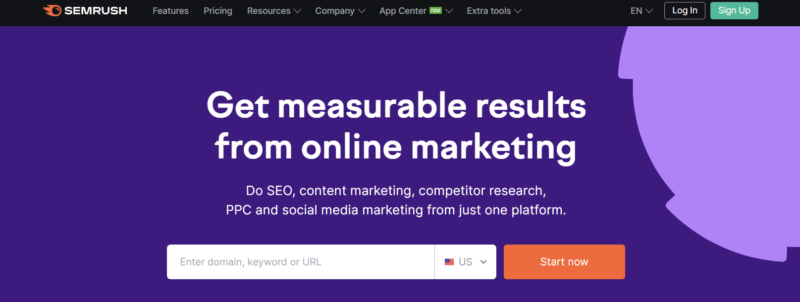

Best for: Marketing teams
As an all-in-one marketing software, Semrush allows you to manage your marketing campaigns and strategies on one platform. You can use it to boost your SEO strategy, track analytics, do keyword research, and automate your social media posts. The tool features a clean, seamless user interface for your convenience.
Key Features
- Built-in keyword research tool
- Content analysis tool
- Content scheduling on social media platforms
- On-page optimization suggestions
- Custom reports
Pricing
Currently, Semrush has three subscription models. You can choose between the Pro, Guru, and Business subscriptions, which are priced at $129.95, $249.95, and $499.95 per month, respectively.
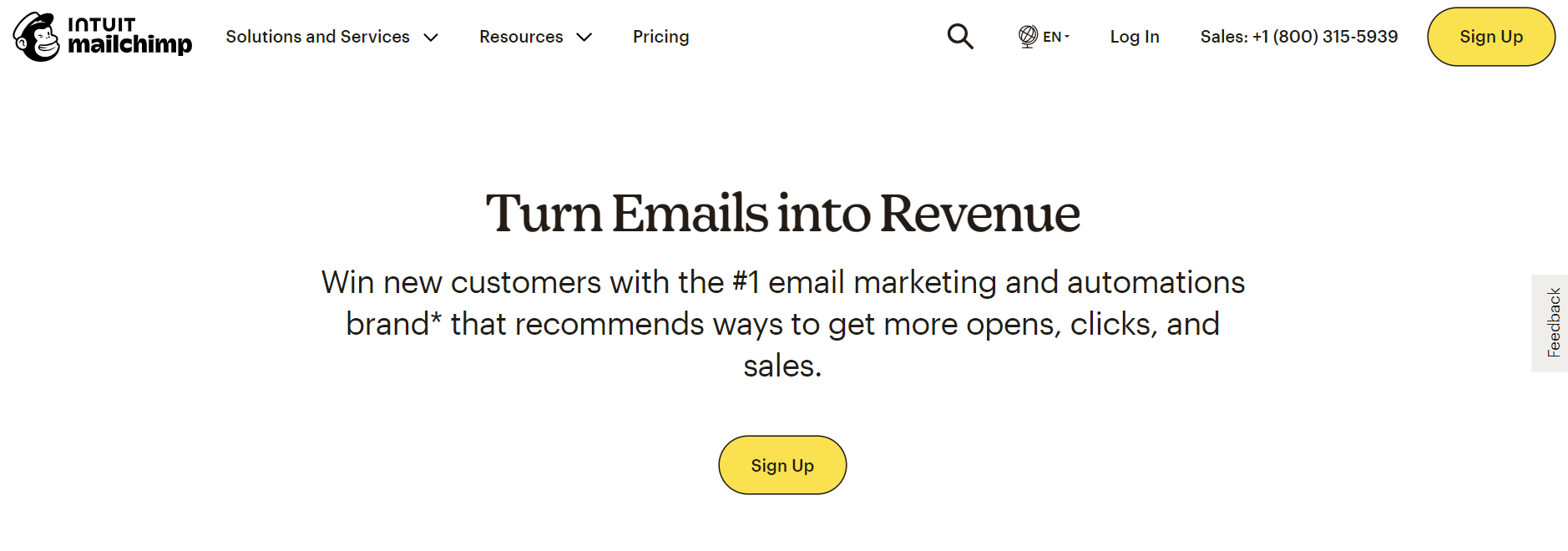

Best for: Email marketing
Boost your email marketing efforts with Mailchimp. This industry leader lets you automate email marketing campaigns, design emails, and connect with your audiences using personalized email content. You can also use the software to send reminders to customers who have abandoned their shopping carts.
Key Features
- Audience segmentation
- Email designing function
- RSS-to-email
- Custom form creation
- Campaign reports
Pricing
For those who have a small mailing list or are starting out in the eCommerce industry, Mailchimp offers its services for free for up to 500 contacts. If your mailing list is over 500, you can opt for one of its bigger plans. Prices will vary according to the number of subscribers you have.
Pricing starts at $13 per month for the marketing platform, while plans for websites and commerce start at $10. Rates for transactional email vary.
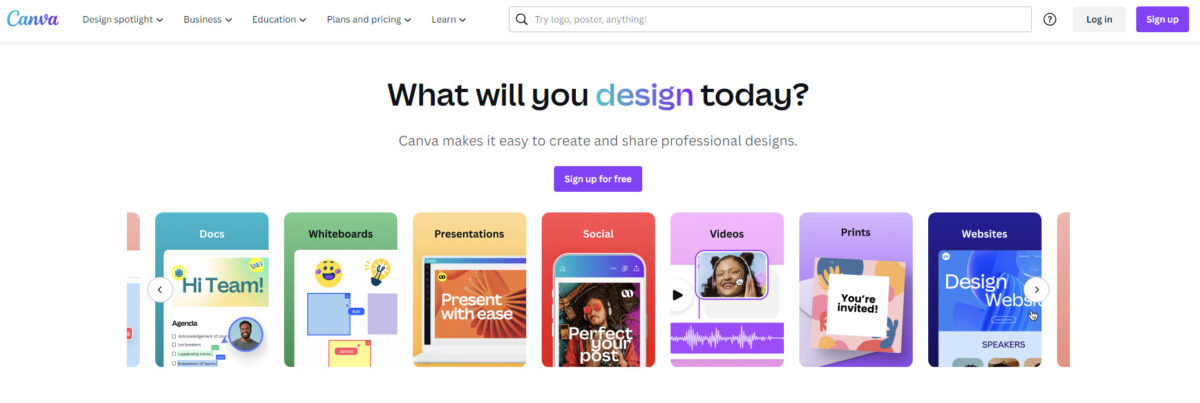

Best for: Small business owners, online entrepreneurs, and marketers needing help with design
Consistent content production is one of the biggest challenges of brands across the globe. Canva, however, strives to make content creation more accessible and easier to do through its drag-and-drop graphic design platform. You can use its basic tools to create posts for specific social media platforms, and you can even make your own brand kit to maintain content consistency.
Key Features
- Plethora of photo editing and content creation tools
- Short video creation tools
- Automatic resizing for social media platforms
- 250,000+ free templates
- Over a million free photos and graphics
Pricing
Canva’s free basic model grants you access to most of its features. However, more overlays, effects, and editing tools can be accessed through its Pro plan for $12.99 a month.
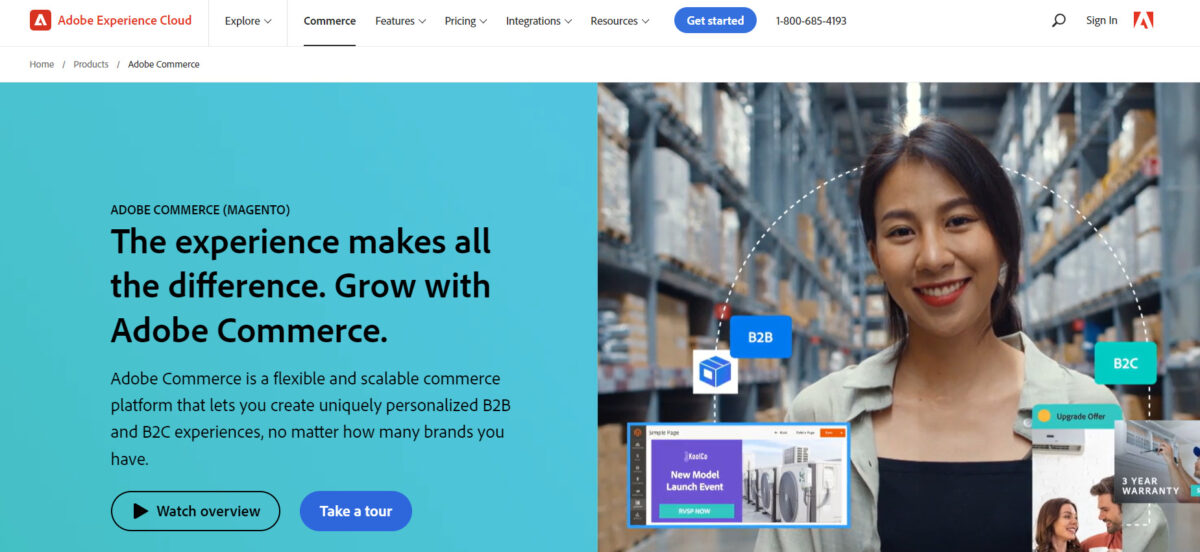

Best for: Enterprise clients wanting to create personalized experiences
Adobe Commerce (formerly called Magento) basically gives you all the tools you need to manage your eCommerce store. The software allows you to build your store from scratch, track orders, and manage operations all on one platform. You can even get reports on insights and analytics to inform your marketing strategies, personalize consumers’ shopping experiences, and optimize how you offer products and services online.
Key Features
- Built-in shipping solutions
- Inventory management tools
- Order management tools
- Tailored promotions and AI-powered product recommendations
- Customer segmentation
Pricing
For more info about Adobe Commerce’s customized pricing, you’ll need to complete an online form on their website.
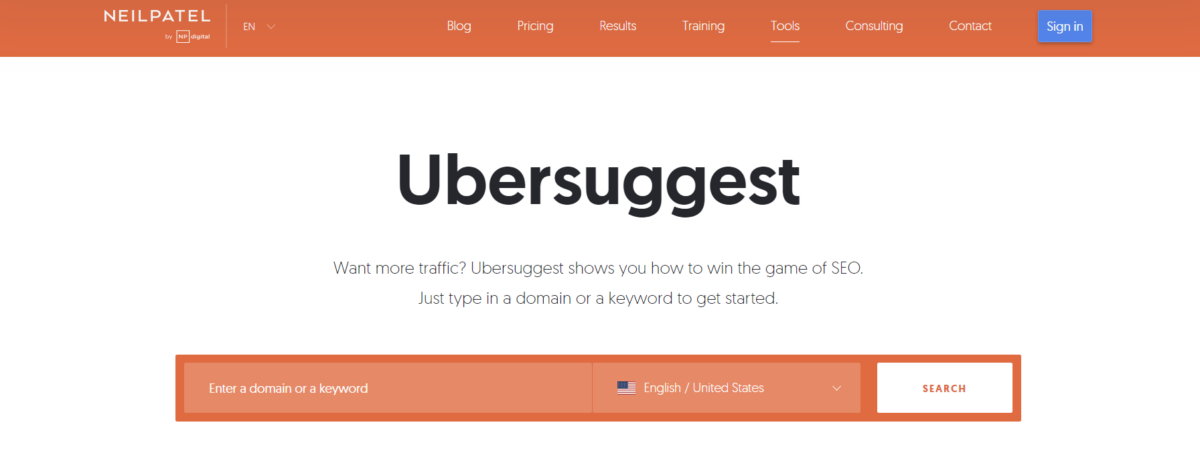

Best for: SEO beginners
SEO is key to standing out on the web. Ubersuggest helps you boost your visibility on search engines, and it provides you insights into how your competitors are performing online. You can also use it to analyze marketing strategies and adapt accordingly.
Key Features
- Keyword research tool
- Domain scoring
- Content ideas
- Backlink analysis
Pricing
You can use some of Ubersuggest’s features for free. However, for a more comprehensive SEO strategy, consider purchasing one of the software’s paid plans.
You can choose between the Individual, Business, and Enterprise plans, which cost $12, $20, and $40 per month respectively.
Instead of paying a monthly fee, it also gives you the option of paying a one-off fee of $120, $200, or $400, depending on the plan you choose.
Not only does it offer a free seven-day trial, but also a 30-day, money-back guarantee.
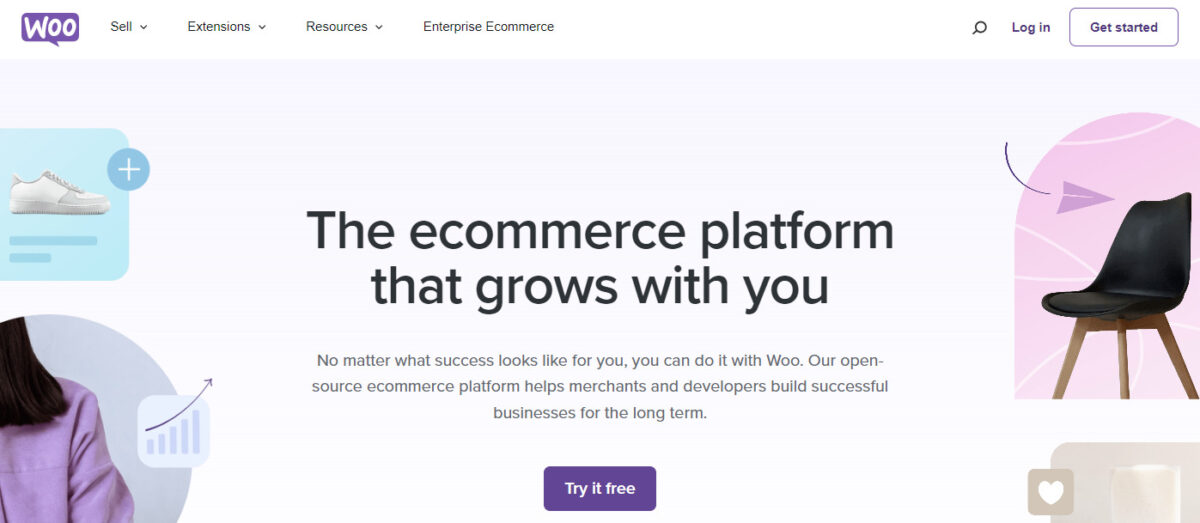

Best for: Retail outlets using WordPress
WooCommerce is designed for those who want to integrate eCommerce features into their WordPress sites. It is fairly easy to use and navigate, and it can help you drive more sales through your website.
Key Features
- Social media integration
- Inventory management
- Free and paid extensions
- Seamless scalability
Pricing
WooCommerce is free and open-source, which makes it a favorite for many eCommerce site owners.
That said, there are still some costs involved in launching a new eCommerce store such as hosting, domain registration, and themes. Depending on your needs, you can end up spending less than $100 or more than $1,000 per month.
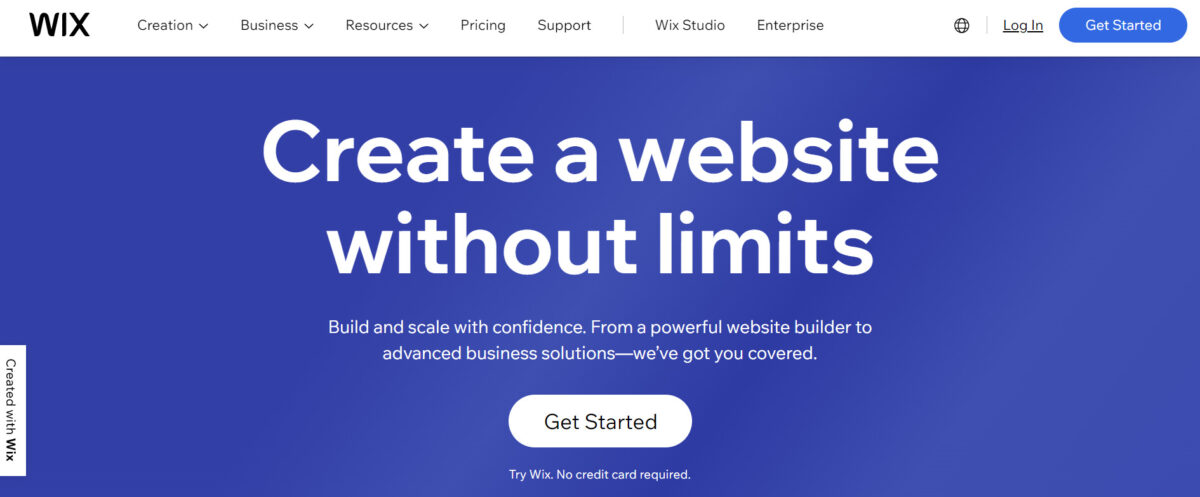

Best for: Small businesses
For a simple and easy website building experience, you can choose Wix. The platform requires zero knowledge in coding, and you can build a comprehensive website in minutes. Your created website is also fully optimized for mobile.
Key Features
- Automatic SEO optimization
- Wide variety of templates to choose from
- Supports dropshipping
- Drag-and-drop tools
Pricing
Wix’s eCommerce website plans start at $17 per month.


Best for: Solopreneurs, content creators, and new small businesses
Like Wix, Squarespace is an easy-to-use website building tool. However, all of its plans already have eCommerce capabilities and are set for online selling. Additionally, if you prefer your websites to have a more elegant and modern feel, this is the platform for you.
Key Features
- Easy integration with popular payment platforms
- A shipping calculator
- Inventory management tools
- Unlimited product selling capability
Pricing
Squarespace has four pricing tiers: Personal, Business, Basic Commerce, and Advanced Commerce. The last three plans allow you to sell online, with pricing starting at $23 per month.
All these plans also include a free, 14-day trial and you can save up to 30% if you pay yearly instead of monthly.
Best for: Remote teams
For help with project management and tracking the productivity of your marketing team, there’s Hubstaff. Forbes named it the best overall employee monitoring tool of 2024.
It offers a host of features to help you make your eCommerce team more productive. In addition to time tracking and project management, it also offers industry benchmarks that can help social media managers and dozens of reports to help with tasks like budgeting.
Key Features
- Payroll management
- Time tracking
- Productivity monitoring
- Detailed reporting
- Online timesheets
- GPS tracking
Pricing
Hubstaff’s paid plans start at $5.83 per user per month when billed annually.
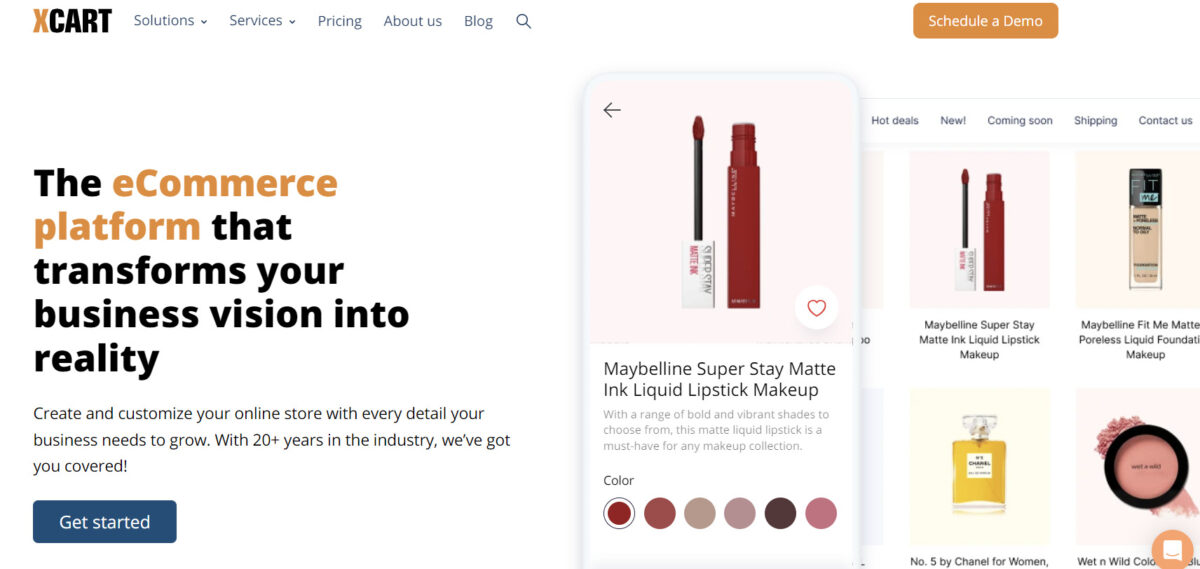

Best for: Global sellers
X-Cart helps you create a scalable online store. From conceptualization to execution, X-Cart lets you build a high-performing, optimized store that can be monitored in terms of its performance and marketing strategy.
Key Features
- Custom web design
- Omnichannel eCommerce
- Built-in analytics tool
- Easy migration
Pricing
X-Cart has a Platform package ($199 per month), a Marketplace package ($399 per month), and Automotive package ($499 per month).
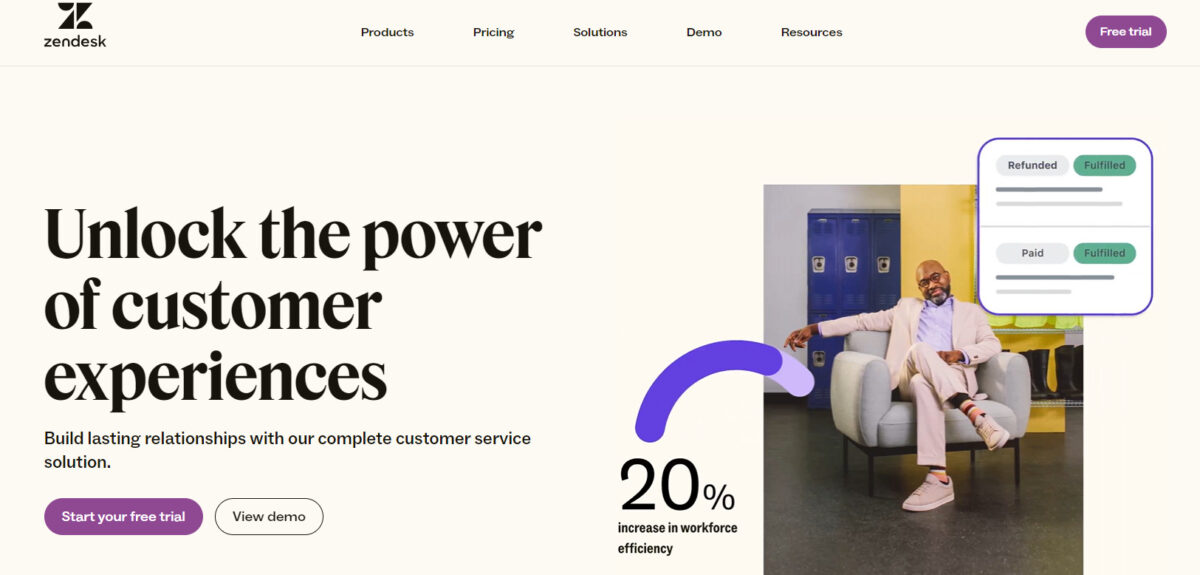

Best for: Multi-channel customer support
Keep tabs on all of your customer concerns with Zendesk. This reliable tool helps you answer customer queries, create message templates, and streamline communications in one platform.
Key Features
- Automated responses
- Extra chat features (e.g., ticket creation via chat)
- Easy-to-set-up bots
Pricing
Zendesk has various subscription models depending on your business needs. Basic plans start from $25 per month.


Best for: SEO
Another SEO enhancement tool, Moz helps you analyze your site to see how it can rank higher on search engines. It is an excellent research tool as well, allowing you to analyze other websites’ domain authority and do keyword analysis.
Key Features
- Keyword explorer tool
- Rank tracker
- Page analytics
Pricing
Moz provides a 30-day free trial. Once the free trial is up, you can opt for one of its paid plans, which range from $99 to $599.
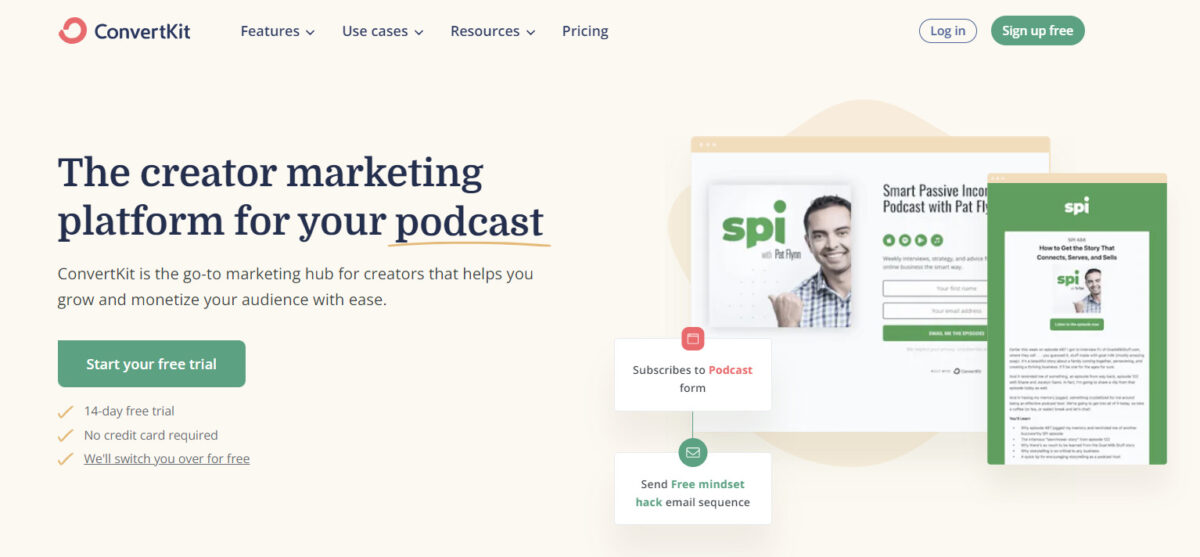

Best for: Email marketing
ConvertKit helps professional creators to grow their online businesses with email. While email marketing is its main focus, it also offers other marketing-related tools. From paid newsletters to online coaching, it makes it easy to market your services or products by letting you set up automated funnels.
Key Features
- Customizable product pages
- Comprehensive dashboard for sales
- Integrated payment processing
Pricing
ConvertKit is free to use up to your first 1,000 subscribers if you’re a new creator. Monthly paid plans for growing and established creators start at $15 and $29, respectively, for up to 300 subscribers.
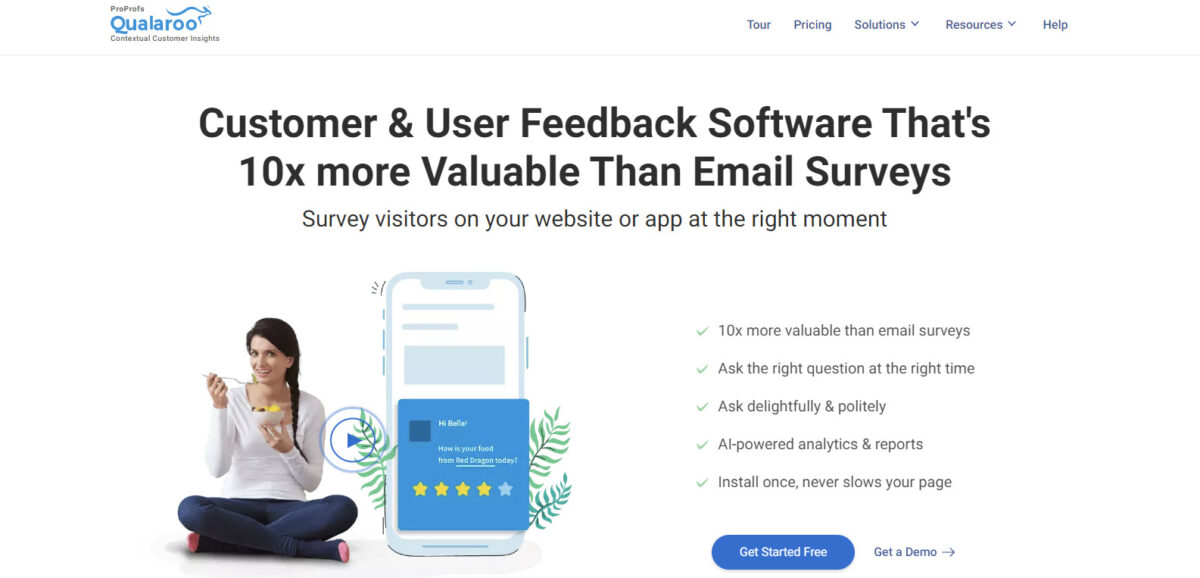

Best for: Small to midsize businesses needing help with website surveys
Qualaroo is a great tool for customer surveys. What makes it such a useful tool to add to your MarTech stack is that you don’t need a huge email subscriber list. Instead, you can survey customers via your mobile app or website. What’s more, you can target website visitors based on specific actions, helping you to create a more personalized experience.
Key Features
- Survey templates
- A/B testing
- AI-powered sentiment analysis
- Reports and analytics
Pricing
Qualaroo offers a number of subscription plans. Pricing starts at $25 per month but restricts you to only email surveys. For the ability to combine both email and contextual surveys, pricing starts at $110 per month.
All the plans include a free 15-day trial and if you opt to be billed annually you can save 20%.
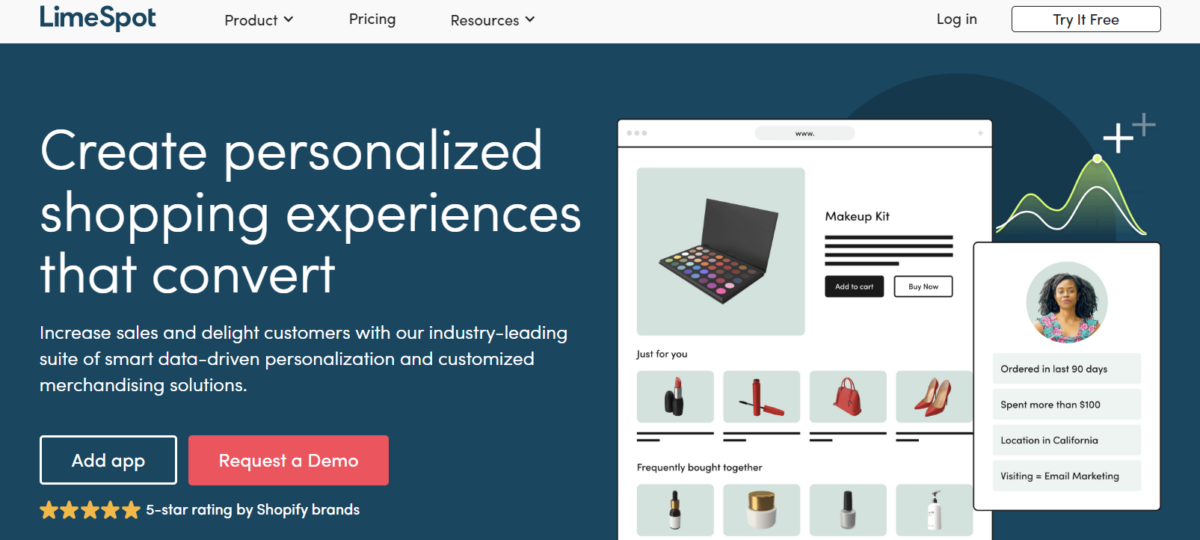

Best for: eCommerce businesses with a large product range
This eCommerce conversion platform helps you create unique and personalized shopping experiences that drive conversions. Its AI-driven platform lets you create a custom experience throughout every stage of your customer’s journey and helps them find the right products at different touch points.
Key Features
- Fully automated AI algorithms
- Templates for segmentation
- Support for all major email service providers
Pricing
LimeSpot’s Personalizer pricing starts at $15 per month.
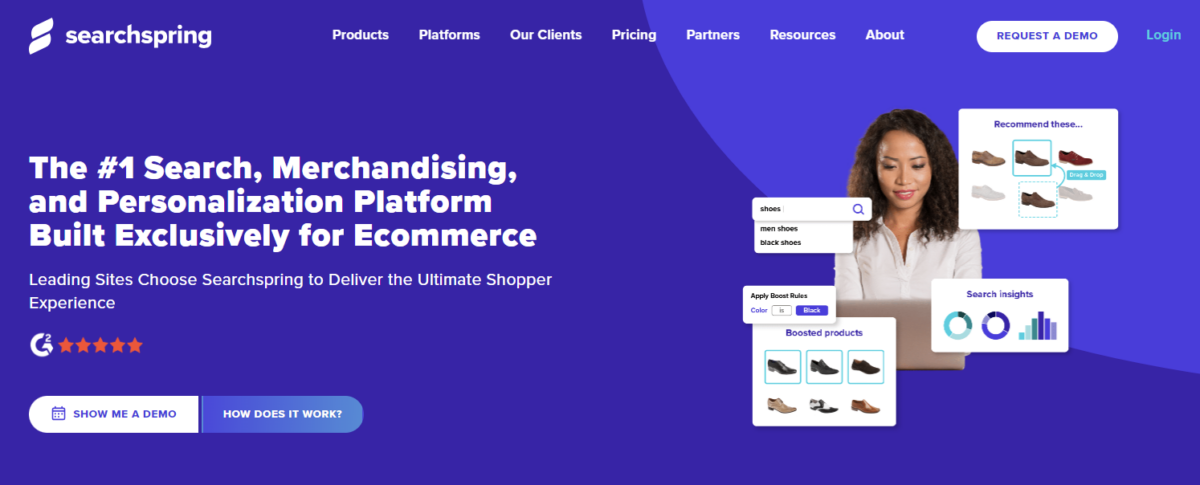

Best for: Marketing teams with bigger budgets
Searchspring is a search and merchandising platform that offers intelligent site search, superior site navigation, and eCommerce reports. It helps your site deliver dynamic search results to your audience fast, without compromising personalization.
Key Features
- Deep analysis (indexing) of product data
- Automated merchandising
- Personalized product recommendations
Pricing
Searchspring’s plans start at $599 per month.
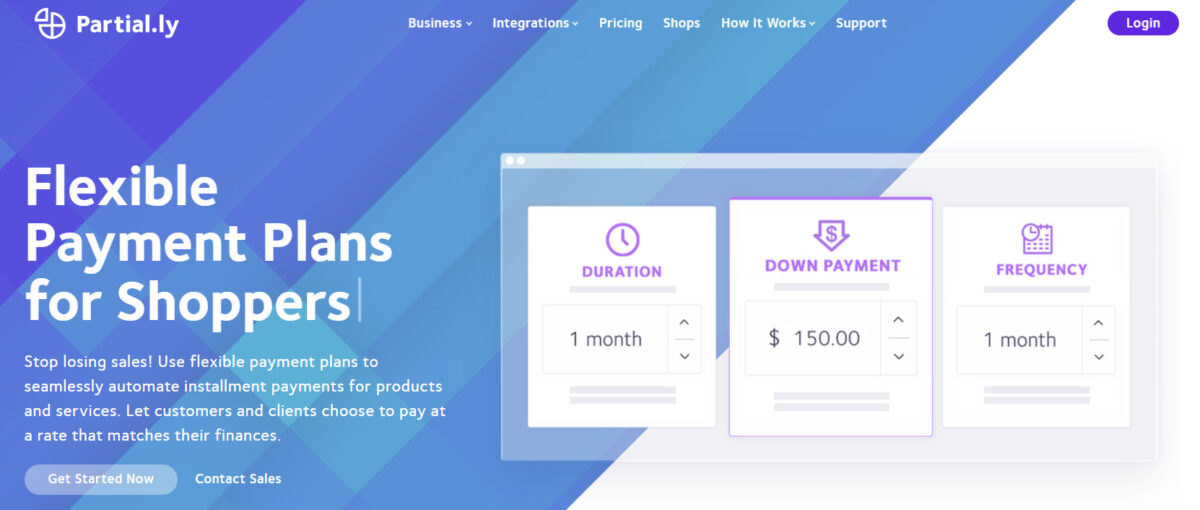

Best for: eCommerce businesses looking to offer flexible payment plans
With Partial.ly, you can offer your customers customizable payment plans to help you increase your conversion rate. It also integrates with leading eCommerce and invoicing software, meaning that you don’t necessarily need to add more tools to your MarTech stack. Once payments have been completed, Partial.ly will notify you so that you can deliver the product.
Key Features
- Flexible manual payment options
- Automated payments
- Automated emails for both merchants and customers
- Convenient merchant portal
Pricing
Partial.ly charges 5% plus 30₵ per transaction. What sets it apart from other payment platforms is it implements the same pricing across over 135 currencies supported by Stripe.


Best for: eCommerce businesses of all sizes looking to offer flexible payment plans
There are several big eCommerce websites that use Klarna including names like Under Armour, Fitbit, and Ralph Lauren. It’s a payment platform that’s designed to help businesses attract, convert, and retain customers by offering them flexible payment options and targeted marketing. For enterprises, Klarna employs AI-powered technology that’ll help you create performance-driven marketing solutions for increased revenue and return on advertising spend (ROAS).
Key Features
- Faster checkout
- Automatic and flexible payment options
- Smooth integration
- Marketing assets like On-site Messaging
Pricing
Klarna’s pricing varies depending on your customers’ location.
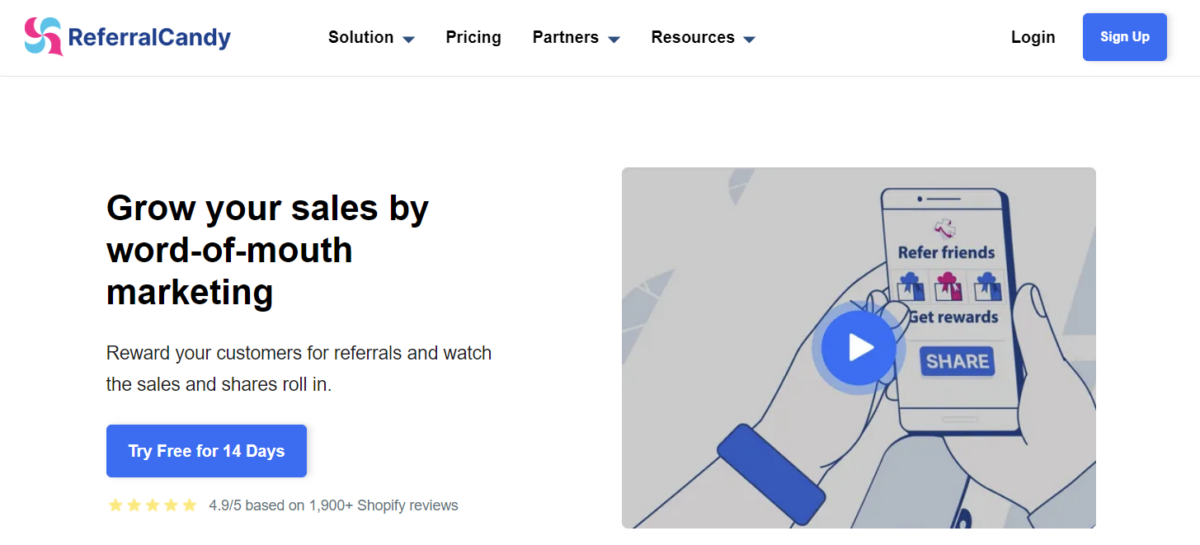

Best for: Affiliate marketing
Regarded as one of the best loyalty tools for eCommerce websites, ReferralCandy offers several sweet features. It integrates seamlessly with the main eCommerce platforms, making it easy to get started. It’s also very versatile and offers you various ways to recruit new affiliates and reward them.
Key Features
- Templates
- Analytics, insights and data reports
- Advanced fraud management
Pricing
Plans start at $59 per month plus 3.5% commission.
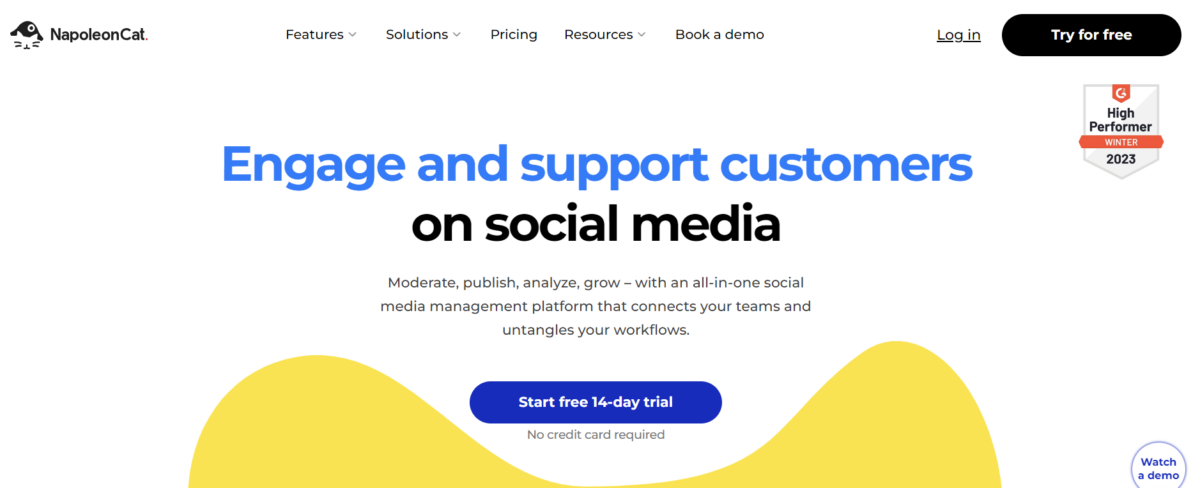

Best for: Small businesses and teams
Rated as one of the best social media scheduling tools, NapoleonCat can help social media marketing teams to save loads of time. It’s intuitive, making it straightforward to publish and schedule content across various popular channels via a single dashboard. It also includes useful moderation features, helping marketing teams to engage with potential customers.
Key Features
- Social media analytics
- Agency and team management
- Engagement tracking
- Competitor tracking
Channels
NapoleonCat supports:
- Google My Business
- Facebook Messenger
- YouTube
- TikTok
Pricing
NapoleonCat has three paid plans. The Standard plan goes for $32 per month while the Pro plan costs $76 per month when billed monthly. Both plans cover three profiles and one user. To purchase a custom plan, you need to get in touch with the NapoleonCat team.


Best for: Website metrics
Brought to you by Google, you can use this web analytics service to monitor website traffic. This can help marketing teams to gain insight into their target audience’s browsing behavior and their journey across different stages enabling them to boost their marketing ROI.
Key Features
- Simple and easy-to-use interface
- Machine learning capabilities
- Shareable reports
Pricing
Google Analytics is free to use. If you want to harness the power of Analytics 360, then you need to get in touch with Google Marketing Platform’s sales team.
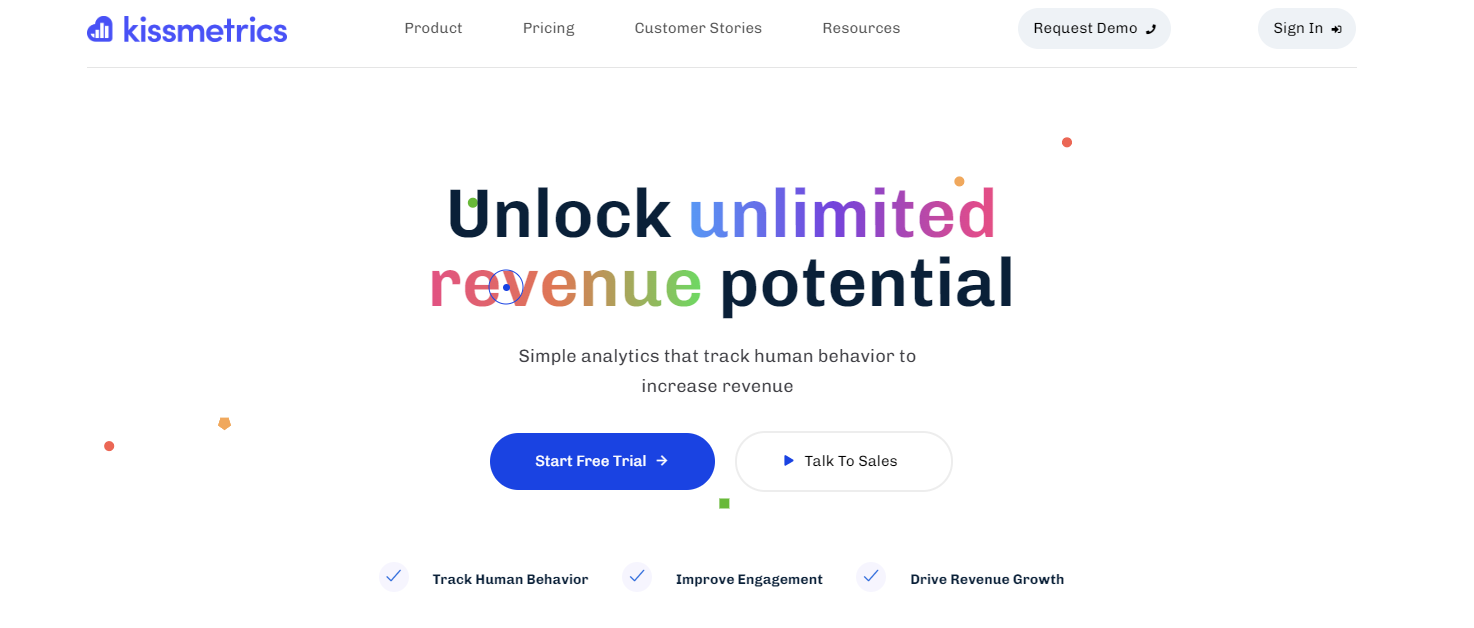

Best for: Deep data tracking
Neil Patel, one of the leading eCommerce influencers, is the brains behind Kissmetrics. It’s a great tool if you need data to help you understand the behavior of your target market better. Armed with these analytics, marketing teams can boost conversions, engage more effectively, and improve customer retention.
Key Features
- Sessions-digital analytics
- Standard event tracking
- Advanced BI reporting
- User, role, and access management
Pricing
After a generous 30-day free trial, pricing starts at $199 per month.
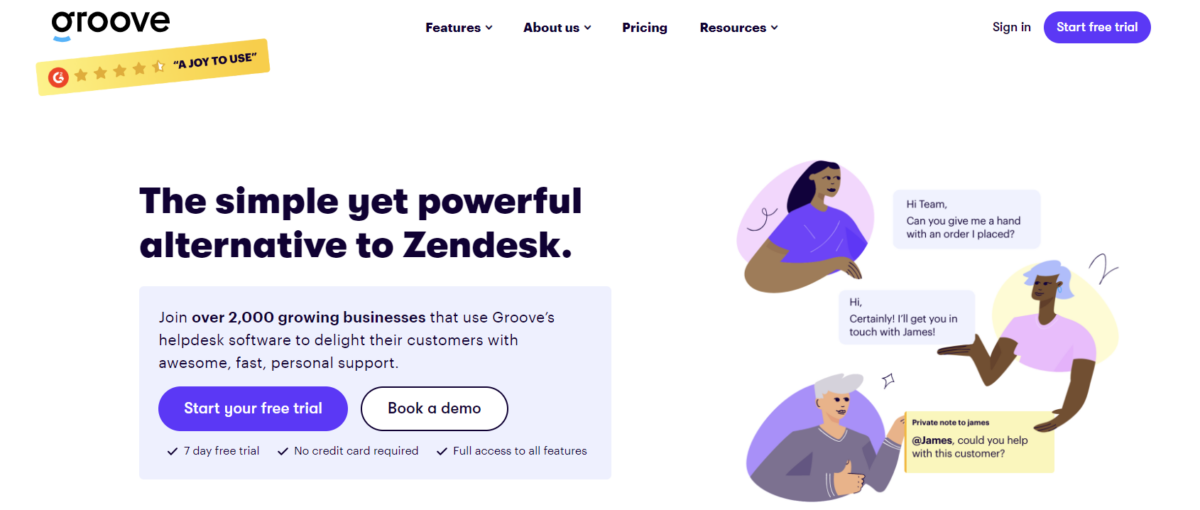

Best for: Startups and small businesses
Groove is a help desk software solution aimed at growing businesses that need help with email marketing and communication. It offers a user-friendly, shared inbox that makes it easier for your marketing and customer service teams to stay on top of customer requests. In addition to the shared inbox, it also offers live chat for eCommerce brands that want to offer real-time support.
Key Features
- Easy to set up
- Email management capabilities
- Internal notes
- API access
- Knowledge base features such as SEO settings and one-click SSL
Pricing
Groove offers three subscription plans. After a free seven-day trial, pricing starts at $15 per seat per month.
Custom pricing for enterprise clients is also available.
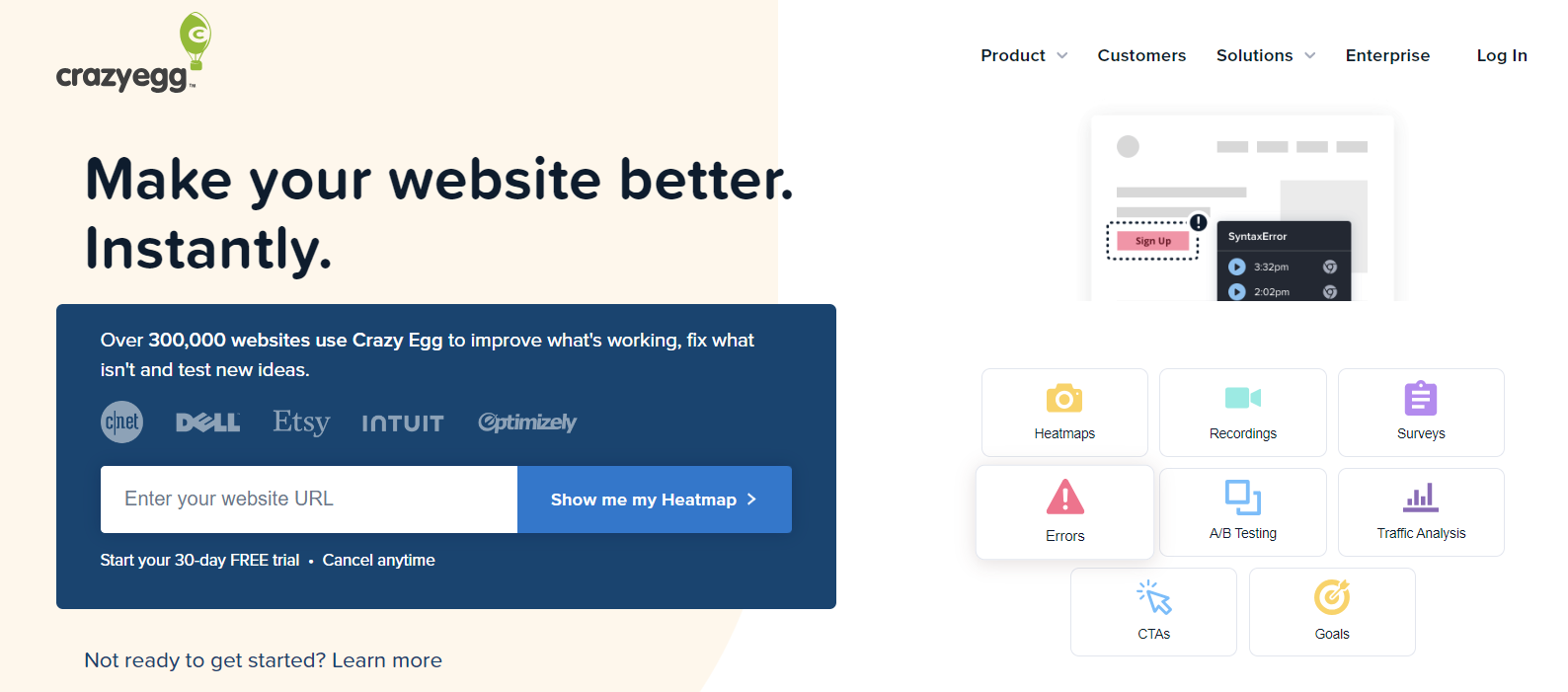

Best for: Website analytics
CrazyEgg is another eCommerce marketing tool that Neil Patel co-founded. It helps you to keep tabs on the performance of your website and identify elements that can do with some improvement. Add to that it’s straightforward A/B testing functionality and you can also use it to test out new ideas.
Key Features
- UI/UX audits
- Customer analysis
- A/B testing
Pricing
CrazyEgg offers a number of subscription plans as well as custom pricing for enterprise clients. After a free 30-day trial, pricing starts at $29 per month when billed annually.
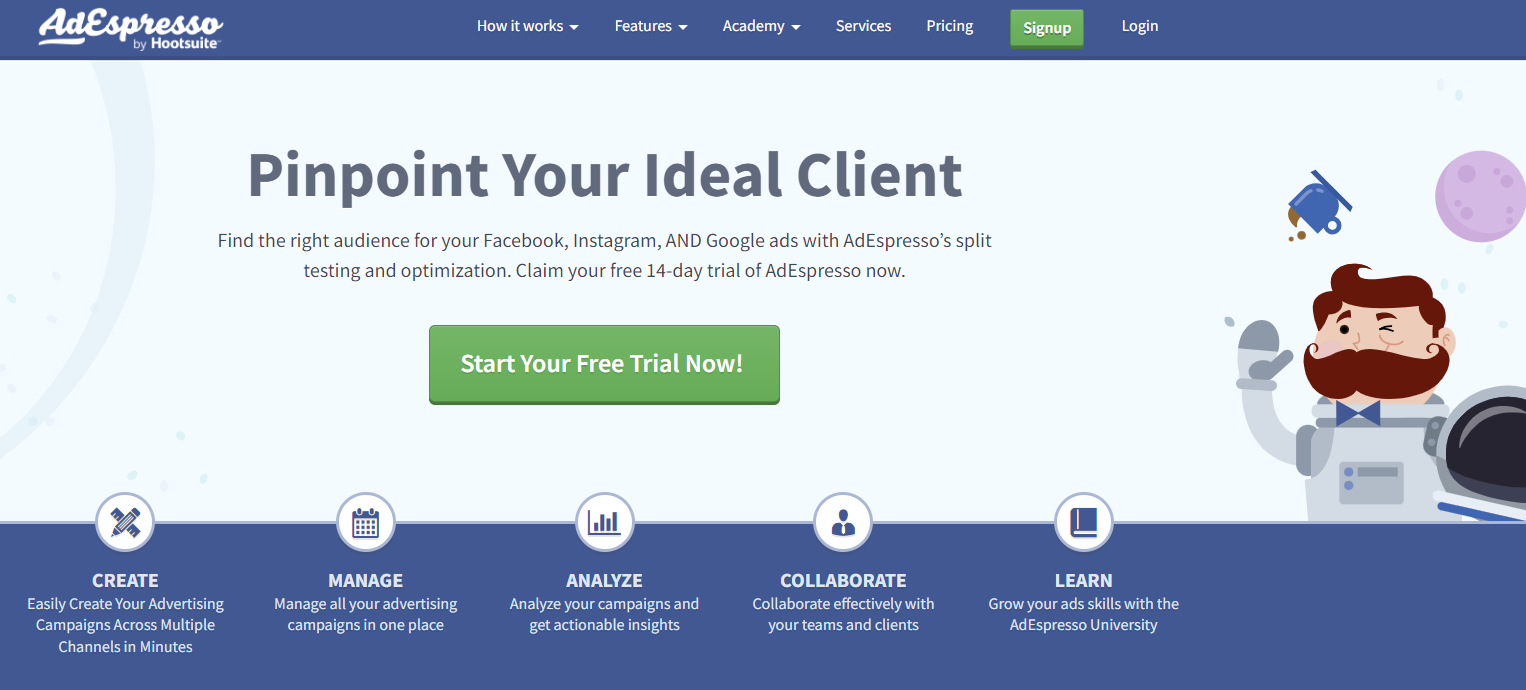

Best for: Facebook Ads
Rated as one of the best tools for Facebook marketing, AdEspresso by Hootsuite is a great tool if you want to leverage paid social more. It offers optimization features along with split testing to help you attract the right audience for your PPC ads. In addition to Facebook, you can also use it for your ad campaigns on Instagram and Google.
Key Features
- Lets you control timing and placement of your ads
- Quick setup
- Split tests
- AdEspresso University for improving your marketing skills
Pricing
After a free 14-day trial, pricing starts at $49 per month when billed yearly.
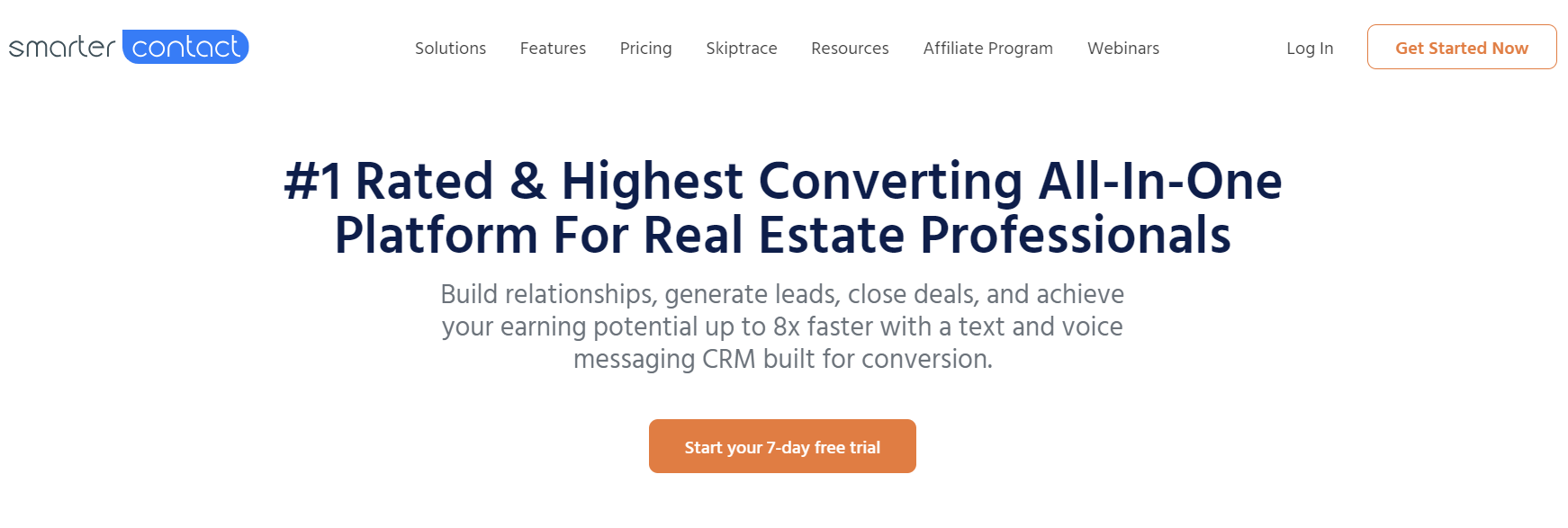

Best for: Text marketing
Text messages is another channel that eCommerce brands can use to reach their target audience. With an SMS marketing platform like Smarter Contact, businesses can create customized marketing campaigns and automatically follow up with leads. It can also help with number lookup (skiptracing). All you need to do is update the name and address of your contacts and Smarter Contact will provide the latest mobile and landline data linked to that user.
Key Features
- Pre-built message campaigns
- Built-in CRM
- Scheduled texts
- Two-way messaging
- Ringless voicemail campaigns
- Reporting
Pricing
Smarter Contact offers a number of subscription plans. After a free seven-day trial, pricing starts at $99 per month when billed quarterly.
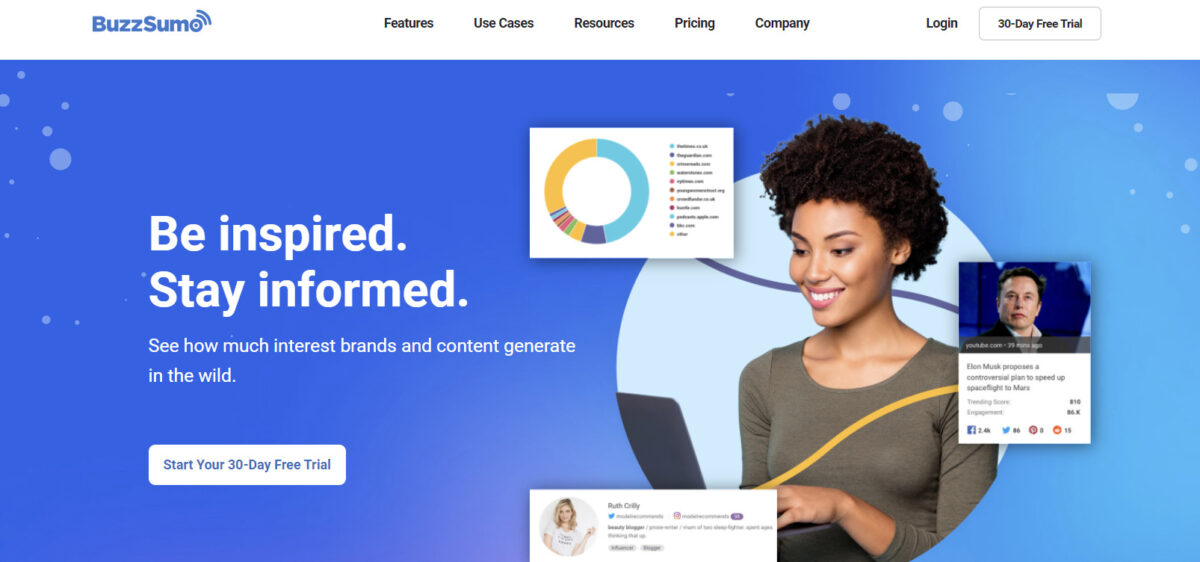

Best for: Content marketing
BuzzSumo is one of the leading content marketing platforms. With its content insights, it’s much easier to come up with relevant ideas and create high-quality content like blog articles and social media posts. It also offers tips for how best to share your new content.
Key Features
- Keyword generation
- Content ideas generator
- Influencer discovery
- Brand mention monitoring
- Backlink tracking
- Competitor intelligence
Pricing
BuzzSumo offers a number of subscription plans. After a free 30-day trial, pricing starts at $119 per month. However, if you opt to be billed annually, you can save 20%.
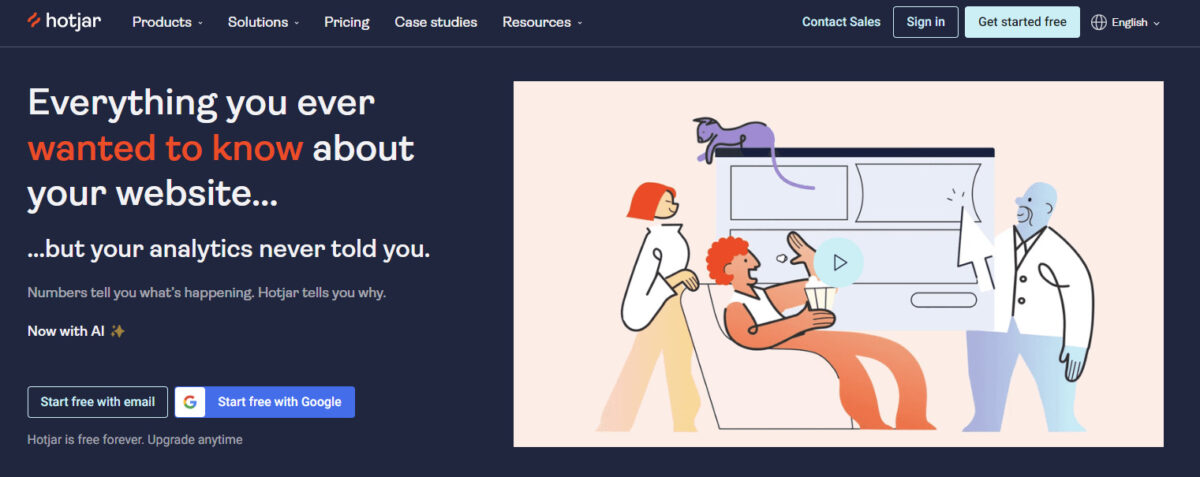

Best for: Website metrics
Hotjar is one of the top website optimization software solutions for online stores. Included in its list of features is a very useful heatmapping tool. With this tool, you can see where website visitors typically click, which sections they ignore and just how far they scroll down the page after landing on your site. All in all, it’s a great tool that can help you to understand how visitors interact with your site. After all, your business website is probably your most valuable marketing asset and, to make the most of it, you’ll need to know where changes are required.
Key Features
- Heatmaps
- Session recordings
- Feedback widgets
- Survey templates
Pricing
Hotjar offers various products and pricing plans. Pricing starts at $39 per month when billed monthly.
All products also come with a free plan. You can also customize your Hotjar package.
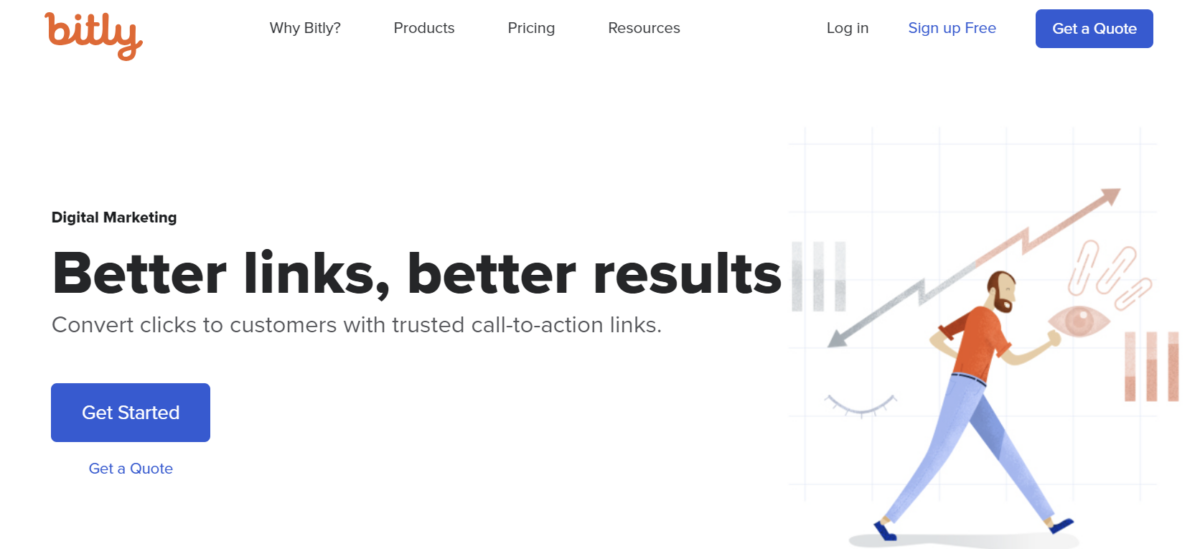

Best for: Link building
Bitly is one of the top URL shorteners and a great marketing tool for brands with a limited marketing budget. In short, you can use it to create branded links to help build brand awareness. It’s also a useful tool for campaign management and analytics as you can use the links to track and optimize all your digital initiatives from one dashboard.
Key Features
- Link management
- Branded links
- Campaign management and analytics
- QR codes
Pricing
Bitly has a free plan. You can also choose from three plans: Starter, Basic or Premium, which are $8, $29 and $199 per month when billed annually, respectively.
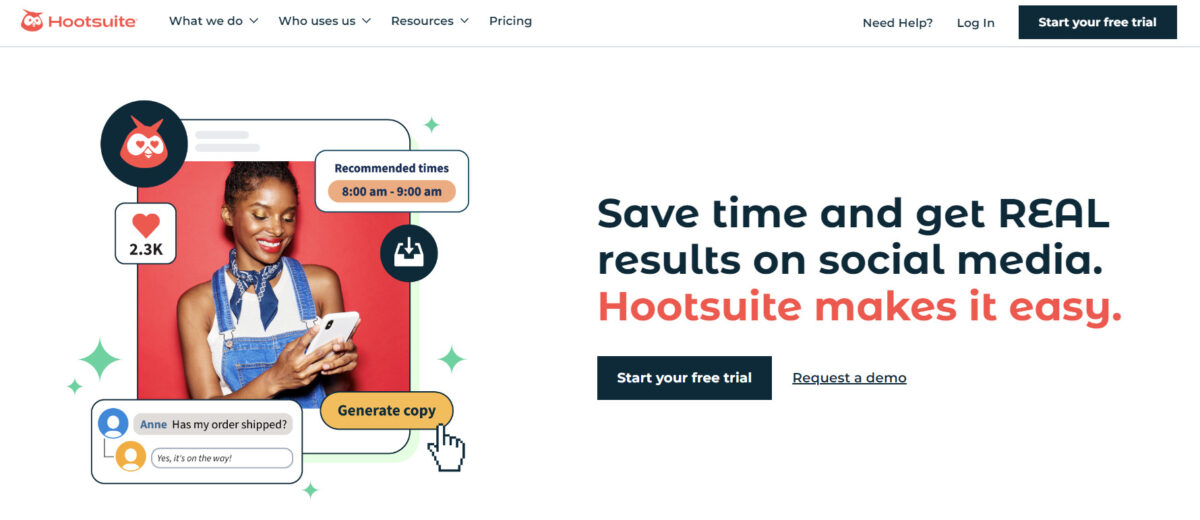

Best for: Midsize to large businesses
This social media management app lets you create, manage, and share your content across multiple channels. You can create and schedule posts, manage all your social media channels, plan your campaigns, collaborate in real time, and track your performance using a single stream.
Key Features
- Multi-channel functionality
- User-friendly interface
- Audience engagement tracking and analysis
Channels
Hootsuite integrates with:
- YouTube
- TikTok
Pricing
After a free 30-day trial, Hootsuite plans start at $99 per month.
Important eCommerce Statistics for 2024
As mentioned, eCommerce is projected to keep growing in the years to come. If you’re a seller on an online platform, it’s essential to take note of these trends and statistics as you map out your business decisions for the upcoming year.
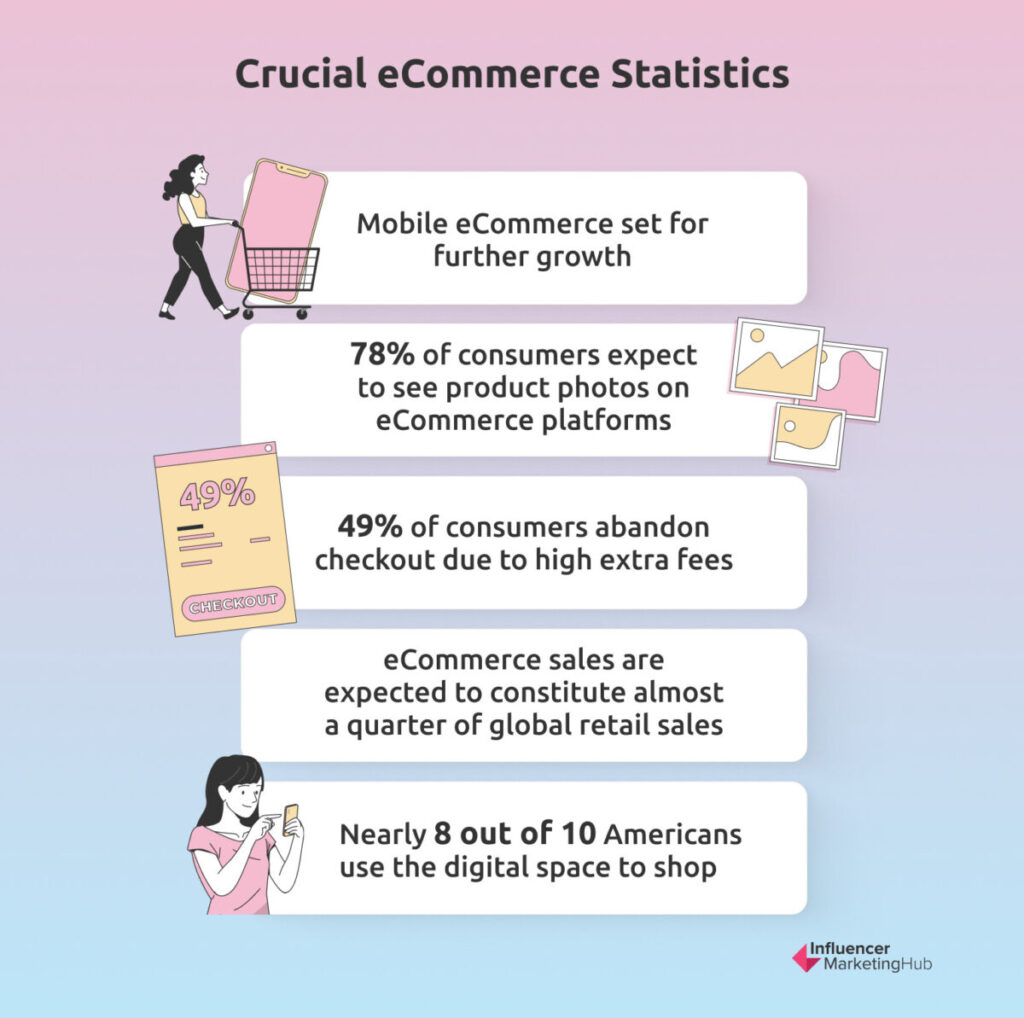

1. Mobile eCommerce is expected to grow even more
The mobile eCommerce market raked in $0.97 billion in 2016 when it first started gaining traction. It grew exponentially from there, eventually hitting $2.91 trillion in 2020. It’s estimated to be worth $6.4 trillion by the end of 2024.
2. 78% of consumers expect to see product photos on eCommerce platforms
eCommerce platforms thrive off visual content. Potential customers want to see what they are purchasing, so product photos are their top expectations from eCommerce stores. Ranked next are product reviews, product comparisons, testimonials from other customers, product demonstrations, and live chat with the brand.
3. 49% of consumers refuse to check out if the extra fees are too expensive
Security issues, complicated check-out processes, and account creation are some of the common factors why consumers abandon their shopping carts, but the most common is when extra fees are too high. The fees in question include shipping, taxes, and miscellaneous expenses.
4. eCommerce sales are expected to make up nearly a quarter of global retail sales by 2024
Because eCommerce is growing exponentially, by 2024, about 22% of global retail sales will be made through eCommerce channels. As more brands turn to the digital space, it’s expected that the role of eCommerce in consumers’ daily lives will become more prominent.
5. Nearly 8 out of 10 Americans use the digital space to shop
To give a clearer picture of how prevalent eCommerce or online shopping is, around 8 in 10 Americans patronize online shopping platforms. This was especially common during the height of the COVID-19 pandemic.
Important Categories for eCommerce Marketing Tools
Given the abundance of eCommerce marketing tools available, you may find it difficult to choose the best one for your needs. This list of eCommerce marketing tool categories will help you keep track of useful tools that cover important aspects of eCommerce for your business.
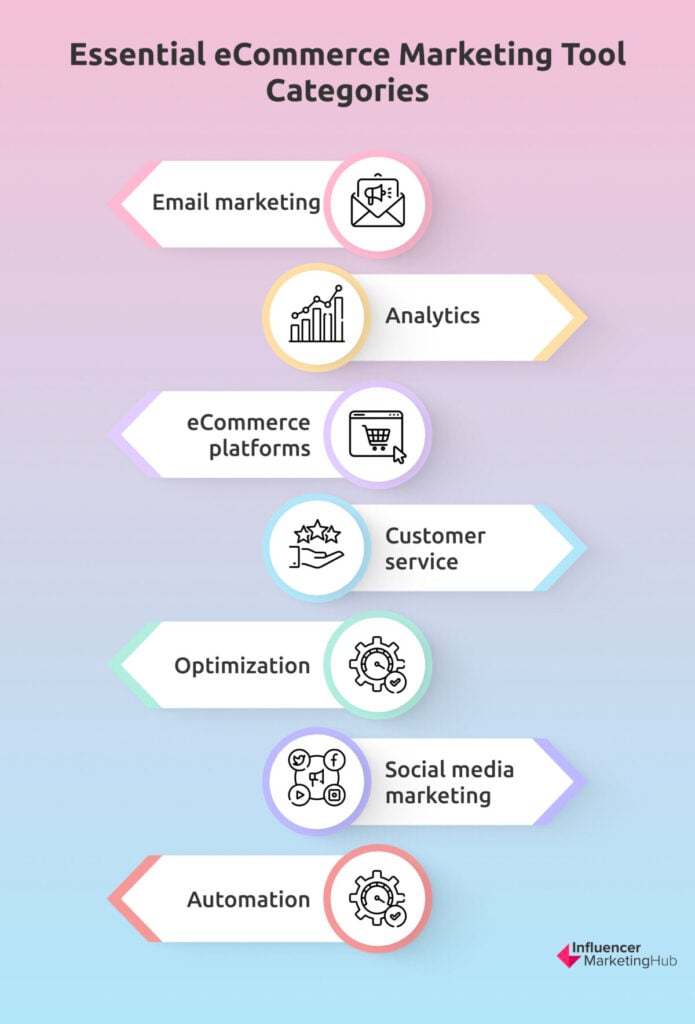

1. Email marketing
Email marketing is a tried-and-tested marketing strategy that, when done right, can improve user engagement, build relationships, promote customer loyalty, and drive sales. Email marketing is commonly used to promote your products or services and let your potential customers know about what you’re currently offering.
It’s one of the best tools for generating leads and boosting your site’s traffic. But why is it so effective?
After phone calls, email is the most used communication method in the US. A massive 92% use email for either work or personal communication.
Email marketing is a powerful tool that presents a world of opportunities for marketers, provided that you get your messaging and targeting right. Often, what happens is emails aren’t optimized, rendering them not interesting enough for recipients to open.
Aside from being easy to track, your email marketing campaigns can be automated, allowing you to save time and focus on other aspects of your business. Popular choices for email marketing tools include:
- Omnisend
- Mailchimp
- ConvertKit
2. Analytics
Without analytics, your campaigns won’t be as effective. Analytics tools use data science and let you gain data-driven insights on things like consumer behavior and market trends. You can use analytics tools to make sense of all the data you’re getting so you can optimize your website or performance, opening it to opportunities for growth and innovation.
Applications of analytics tools include monitoring how visitors are engaging with your site, understanding what your customers need, and showing you opportunities for attracting more customers. Some of the key metrics to track include customer retention, conversion rates, customer engagement, and mobile adoption.
Analytics tools take the guesswork out of marketing strategies and let you create more targeted and optimized campaigns. Some of the best analytics tools include Moz and Semrush. Both of these are capable of going above and beyond analyzing customer data. They’re also capable of letting you track brand mentions, optimize your website, use keyword exploring tools to find out what customers are searching for, and conduct backlink analysis.
3. eCommerce platforms or website builders
One of the most crucial components of any eCommerce business is having a platform or a website that lets you showcase your products, manage your online store, and get insights from the data you receive. Think of your eCommerce platform as your foundation—without it, you’re practically treading on thin ice. Without an eCommerce platform, it’s almost impossible for your business to compete and thrive online.
Note that the eCommerce platform you end up choosing will have an effect on your business’s progress. Different platforms and website builders come with their own unique set of built-in tools, which are ultimately designed to help you scale your business. When choosing an eCommerce platform for your business, keep the following tools and features in mind:
- PCI compliance
- Excellent customer support
- Built-in eCommerce features such as analytics and reporting
- Mobile-friendliness
- User-friendly interface (preferably with a drag-and-drop functionality)
The best way to determine whether or not an eCommerce tool is right for you is to start a free trial and ask the sales and support staff relevant questions. Furthermore, you can check out the websites of eCommerce platform providers so you can get a bird’s-eye view of features and pricing plans.
While it may be tempting to go with popular options, sometimes, they’re not always the right fit for your business. Consider if a particular platform is able to help you meet your desired outcomes and objectives for your business. To help you get started, you can check out the following eCommerce platforms:
4. Customer service
Customer service has the power to make or break a business. On the one hand, a positive customer experience can drive sales, boost your average order value, increase customer loyalty, and encourage customers to give your business a positive review. On the other hand, a poor customer experience can prompt customers to stop doing business with you. In 2022 alone, 58% of customers stopped patronizing a business because of poor customer service.
Make sure that you provide your customers with the best customer service experience by leveraging customer service or support tools like Zendesk and Groove.
5. Optimization
Optimization, whether you’re talking about website optimization, product optimization, conversion rate optimization (CRO), or search engine optimization (SEO) is crucial for your business’s success. By ensuring that all aspects of your site or business is optimized, you’re helping your customers make the most out of what you’re offering.
Furthermore, optimization is a crucial component for increasing conversion rates. By giving customers a more streamlined and seamless shopping journey, you’re making it easier for them to convert. CRO, for example, lets you get more value from your customers while allowing you to enjoy lower customer acquisition costs.
Once you’re able to optimize your conversion rates, you can start enjoying benefits such as increased revenue, more leads, and increased website traffic.
SEO, in particular, can help drive more customers to your site through organic search, promote brand awareness, and complement your other marketing campaigns. Best of all, you can track your performance so you’ll know where you stand and come up with appropriate strategies to scale your business.
6. Social media marketing
Social media has become a large part of our daily lives and it proves to be a valuable marketing asset. Social media platforms let you find, connect, and engage with your target audience.
Social media marketing platforms help you find brand ambassadors, monitor their performance, create and manage content, and more. Some tools are also capable of enhancing your social reach, giving you insights for building your brand strategy, and helping you create optimized ad campaigns.
7. Automation
Automation covers a lot of ground, including ad automation, workflow automation, and task automation. We spend a lot of time on completing mundane or repetitive tasks that we often get distracted from doing other more important tasks. With marketing automation tools, you’re able to operate more efficiently .
Automation tools can increase productivity, enhance employee engagement, enable you to tackle more complex processes or issues, and give you more opportunities to provide customers with a better experience overall.
eCommerce Marketing Trends That Will Shape 2024
Now that you know the tools and platforms you can use to enhance your eCommerce strategy, here are some of the marketing trends that you should take note of and look into adopting.
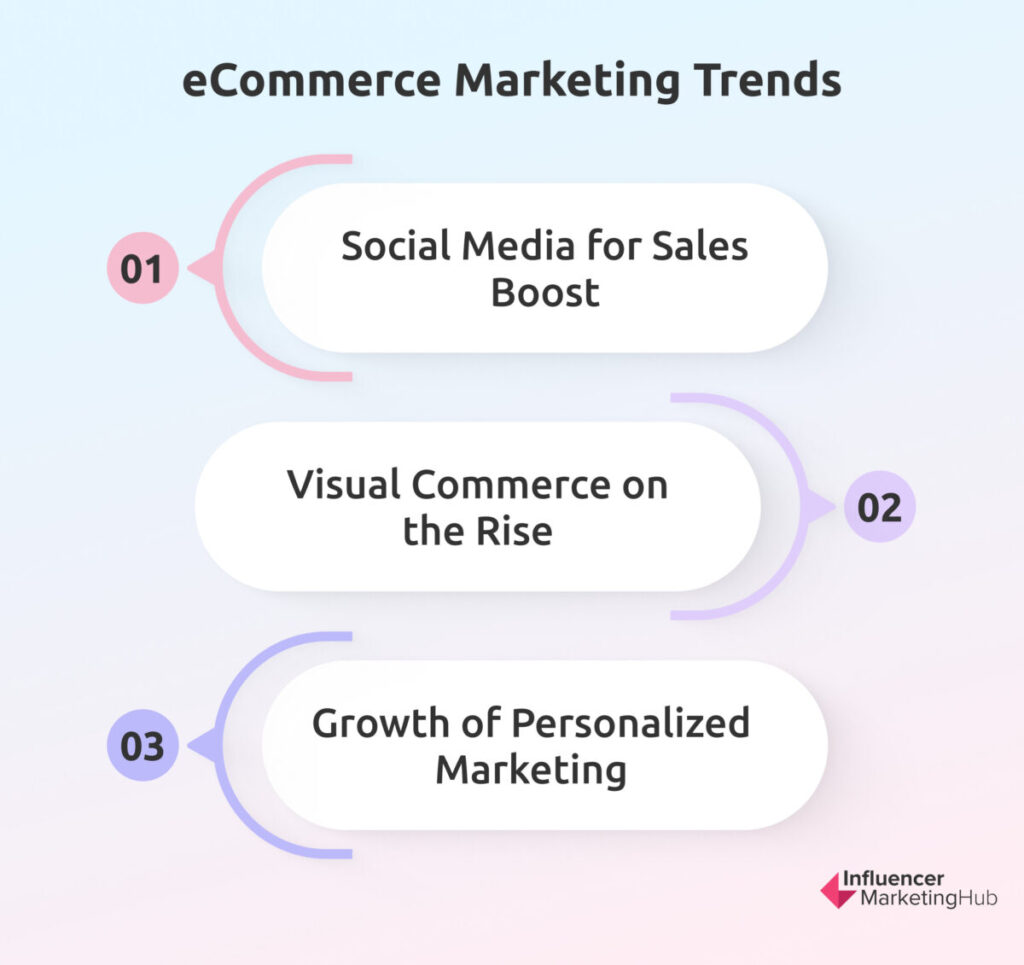

1. Social media platforms will be used to drive more sales
Social media platforms now have shopping tools that online sellers can use to list their products and services. This will allow consumers to purchase items without having to exit the app or visit a third-party site.
2. Visual commerce will be leveraged by more brands
The way that brands and businesses use visual media will be elevated. Instead of the usual product photos, brands will begin incorporating and utilizing different types of media like videos, user-generated content, and even augmented reality.
These types of media will further enhance consumers’ shopping experiences and make an online store far more appealing. Additionally, it will liken the virtual shopping experience to an in-person one.
3. There will be an increase in personalized marketing strategies
Nowadays, customers are looking for a more personalized shopping experience, as this makes them feel that a brand cares about their wants and needs. By incorporating personalization into its strategies, a brand also makes it easier for customers to find things that they might want to purchase.
80% of consumers are more likely to purchase from a brand with a strong personalization strategy. Because of its effectiveness, roughly 89% of marketers are already using this tactic for retail businesses.
To create personalized marketing strategies, consider using a platform that enables you to monitor consumer purchasing behavior. Additionally, do deep research on your target audience to get a better grasp of what they look for in a product or service. This will help you understand your customers more, allowing you to create better personalized content.



لا تعليق